Unit 2 Going to See a Film 第1课时 基础知识及拓展(课件)-2021-2022学年七年级英语下册同步备课系列(牛津上海版)
文档属性
| 名称 | Unit 2 Going to See a Film 第1课时 基础知识及拓展(课件)-2021-2022学年七年级英语下册同步备课系列(牛津上海版) |
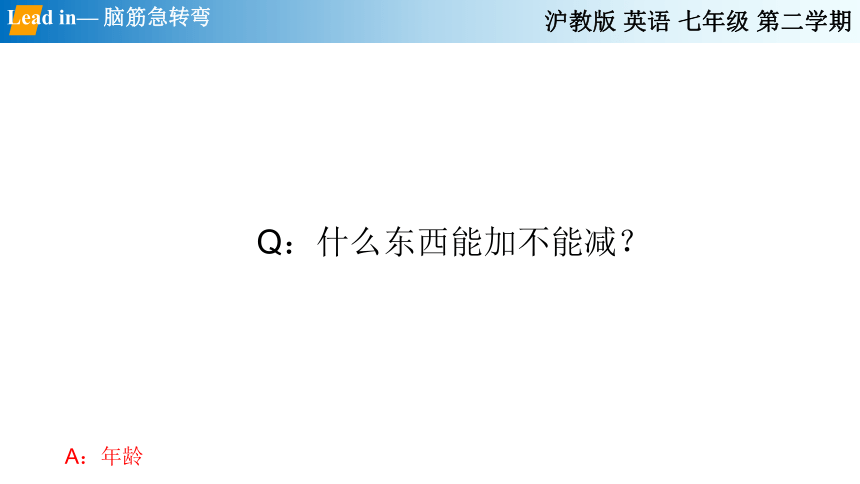
|
|
| 格式 | pptx | ||
| 文件大小 | 296.3KB | ||
| 资源类型 | 试卷 | ||
| 版本资源 | 牛津上海版(试用本) | ||
| 科目 | 英语 | ||
| 更新时间 | 2022-02-18 13:58:37 | ||
图片预览



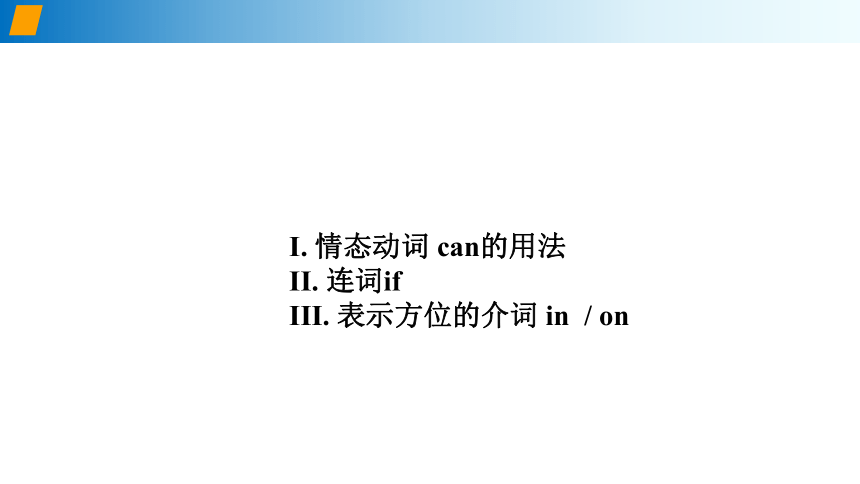
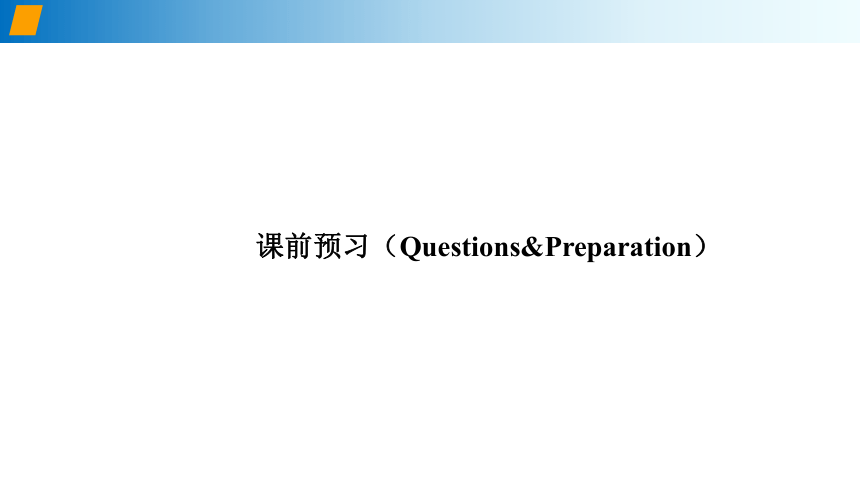

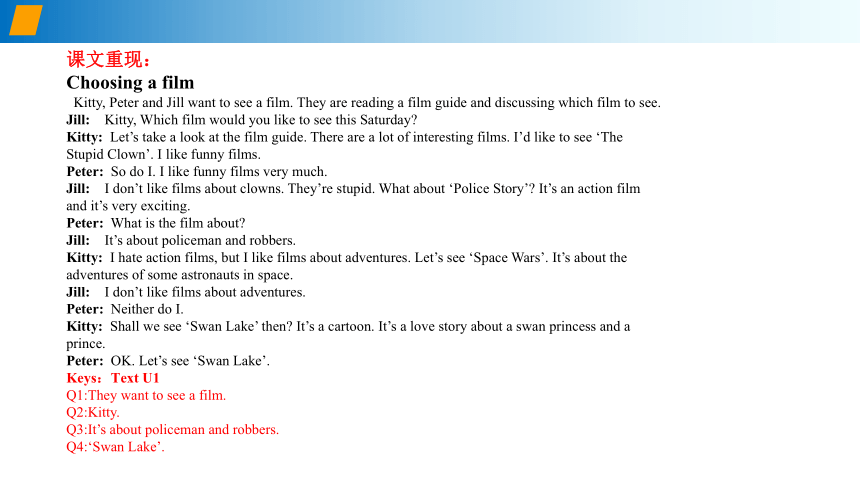

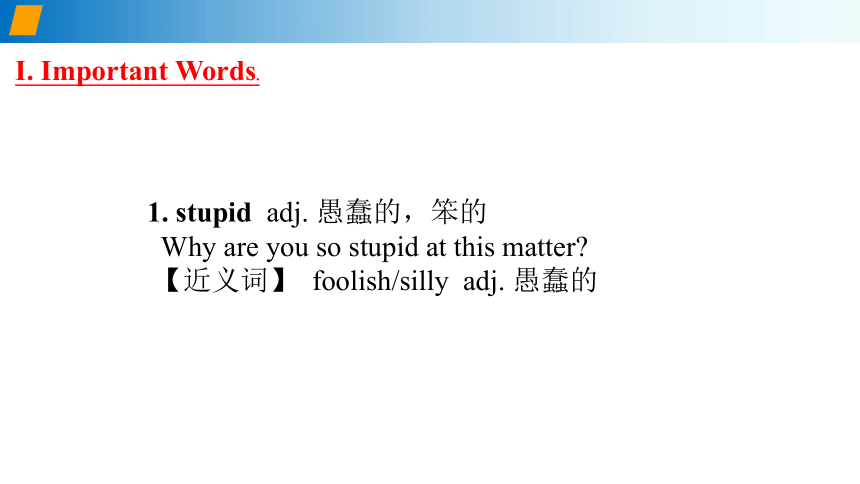
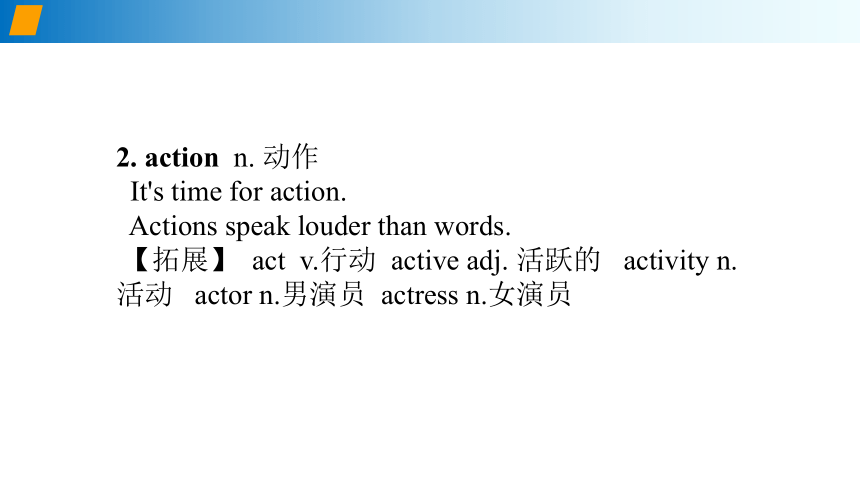
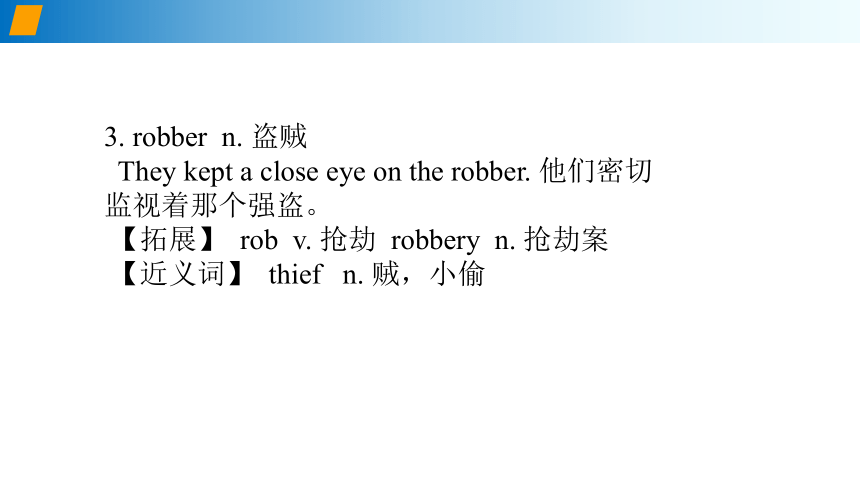
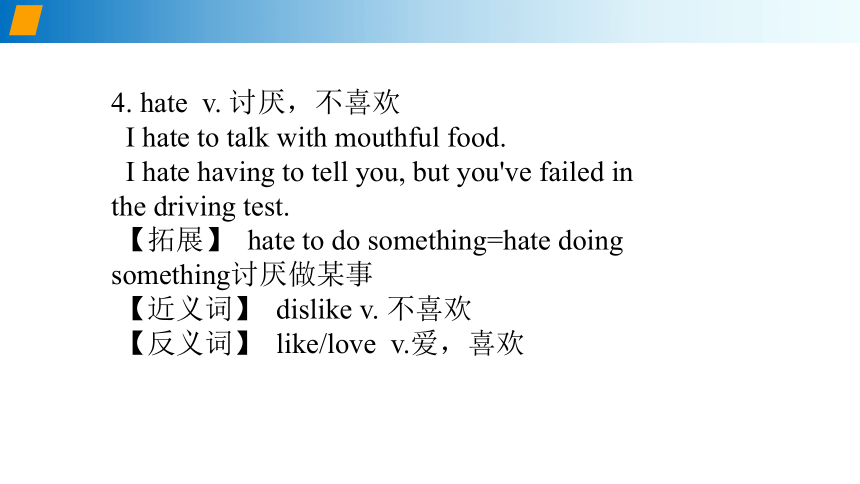
文档简介
(共42张PPT)
Lead in— 脑筋急转弯
Q:什么东西能加不能减?
A:年龄
沪教版 英语 七年级 第二学期
Snow and Ice Knowledge 冰雪知识
Skeleton钢架雪车
沪教版 英语 七年级 第二学期
网友因其英文名称还调侃:“雪道的尽头是骨科”。
闫文港
2022北京冬奥会铜牌获得者
课前回顾
I. 情态动词 can的用法
II. 连词if
III. 表示方位的介词 in / on
课前预习(Questions&Preparation)
1.Text U2:Going to See a Film
Read the text and answer the questions above the text.
Q1. What do they want to do
___________________________________________________________
Q2. Who like funny films
___________________________________________________________
Q3. What is ‘Police Story’ about
___________________________________________________________
Q4. Which film do they decide to see in the end
___________________________________________________________
课文重现:
Choosing a film
Kitty, Peter and Jill want to see a film. They are reading a film guide and discussing which film to see.
Jill: Kitty, Which film would you like to see this Saturday
Kitty: Let’s take a look at the film guide. There are a lot of interesting films. I’d like to see ‘The Stupid Clown’. I like funny films.
Peter: So do I. I like funny films very much.
Jill: I don’t like films about clowns. They’re stupid. What about ‘Police Story’ It’s an action film and it’s very exciting.
Peter: What is the film about
Jill: It’s about policeman and robbers.
Kitty: I hate action films, but I like films about adventures. Let’s see ‘Space Wars’. It’s about the adventures of some astronauts in space.
Jill: I don’t like films about adventures.
Peter: Neither do I.
Kitty: Shall we see ‘Swan Lake’ then It’s a cartoon. It’s a love story about a swan princess and a prince.
Peter: OK. Let’s see ‘Swan Lake’.
Keys:Text U1
Q1:They want to see a film.
Q2:Kitty.
Q3:It’s about policeman and robbers.
Q4:‘Swan Lake’.
Words & Expressions
Ⅰ. Important Words.
1. stupid adj. 愚蠢的,笨的
Why are you so stupid at this matter
【近义词】 foolish/silly adj. 愚蠢的
2. action n. 动作
It's time for action.
Actions speak louder than words.
【拓展】 act v.行动 active adj. 活跃的 activity n.活动 actor n.男演员 actress n.女演员
3. robber n. 盗贼
They kept a close eye on the robber. 他们密切监视着那个强盗。
【拓展】 rob v. 抢劫 robbery n. 抢劫案
【近义词】 thief n. 贼,小偷
4. hate v. 讨厌,不喜欢
I hate to talk with mouthful food.
I hate having to tell you, but you've failed in the driving test.
【拓展】 hate to do something=hate doing something讨厌做某事
【近义词】 dislike v. 不喜欢
【反义词】 like/love v.爱,喜欢
5.* adventure n. 冒险,奇遇
All the children listened to his adventures with full attention.
【链接】 What an adventure!啊呀,真险!
6. princess n. 公主
Princess Anne is the daughter of Queen Elizabeth.
7. prince n. 王子
The prince lived in a large and beautiful castle.
8. duration n. 持续时间
We hope the war will be of short duration.
【拓展】 during prep. 在...期间
9. laughter n. 笑,笑声
I can hear his laughter even in the next room.
【拓展】 laugh v.大笑,发笑 laugh at sb=make fun of .嘲笑某人
10. cowboy n. 牛仔
One evening the school showed a cowboy film.
11. diary n.(工作日程)记事簿
I notice you keep a diary all the time.
12. pay v.付费(pay-paid-paid)
He didn't pay me anything.
【拓展】 pay n. 工资,报酬:The workers ask for higher pay.
13. altogether adv.总共,一共
Altogether there were 18 people in the bus.
【近义词】 in all总共,全部
14. price n. 价格
What is the price of this pair of trousers
= How much is this pair of trousers 或How much does this pair of trousers cost
【拓展】 precious adj. 高价的,昂贵的,贵重的,宝贵的
15.*avenue n. 大街
Fifth Avenue is a good place for shopping.
指点迷津: avenue, street, road, lane 和way
avenue指“宽敞的大路或街道,通常是城镇两边有树的、通往较大建筑的大街”;
street指“城镇里较窄、短的重要的街道,两旁多有建筑物”;
road指“较长、宽的路,通常是行驶车辆,且穿过城镇或连接其他城镇的道路”;
lane指“乡间的小路或城镇里狭窄的胡同、街道”;
way指“通向某一处的道路”。
16. bookshop n. 书店
I found this book in a second-hand bookshop in Edinburgh.
【近义词】 bookstore n. 书店
17. route n. 路线 与route搭配的形容词多用long或short,而不用far或close。
We came by a longer route than usual.
Which is the shortest route to the supermarket
Ⅱ. Daily expressions. 日常表达
1. take a look意为“看一看”。
与have a look意思相同,可以互换。take/have a look比look at更口语化。
Let’s take a look around the exhibition..(= Let’s have a look around the exhibition. )
2. (be)full of意为“充满;挤满”。
He is a man full of energy.
【近义词】 be filled with
The bottle is full of water.
The bottle is filled with water.
【拓展】fill with 填满 The ship filled with the river.=The river was filled with ship.
3. pay for意为“为……付钱”。
I can't pay for the sofa now. Will you bill me (for them) later
How much did you pay for your new computer
指点迷津: spend, cost, take, pay 和pay for
(1) spend的主语必须是“人”,宾语可以是钱、精力、时间等.
Spend money/time on sth./spend money/time(in) doing sth.
He spends much money on DVDs. 他将很多钱花在买光盘上。
Every morning he spends half an hour on English/(in) reading English.
(2) cost的主语必须是“物” 或“事”,表示“费用,耗费”,侧重于花费的代价。如:
The key ring cost him one dollar.
The experiment cost him two years of work.
(3) take表示“花费”时,其主语一般是“一件事”,有时主语也可以是“人”,它说明完成某事“花费了……”。如:
It took me ten minutes to walk to the post office. 步行到邮局花了我十分钟时间。
The producer took two years to make the film. 制片商花了两年时间完成这部影片。
【友情提示】“take…to do something"句型侧重完成该动作花费的时间
“spend…doing something”句型有时并不说明动作的完成。
It took him an hour to read the book.他用一小时读完了这本书。
He spent an hour (in) reading the book.他花了一小时读这本书。(并未说明他是否读完了)
(4) pay的基本意思是“支付”,作为及物动词,宾语可以是“人”或“钱”。如:
He paid the taxi and hurried home.
They had to pay two hundred yuan before leaving the place.
We'll pay you in a few days.
(5) pay for的宾语为“物”或“事”,for常常表示支付的原因。
You'll have to pay me 70 yuan a week for your meals.
【注意】下面两句中pay for的意义不同。
Of course we have to pay for what we buy. 我们买东西当然得付钱。
Don't worry about money; I'll pay for you. 别担心钱的问题,我会替你付的。
III. Important Phrases.
(1) 一张电影指南a film guide
(2) 看一看take a look/have a look
(3) 滑稽电影funny films
(4) 功夫片action films
(5) 在太空中in space
(6) 一个爱情故事a love story
(7) 几个宇航员的太空冒险the adventures of some astronauts
(8) 警匪片police story
(9) 天鹅公主和天鹅王子a swan princess and prince
(10) 在马戏团里in the circus
(11) 充满be full of =be filled with
(12) 充满动作的电影 a film full of action/ a film filled with a lot of action
(13) 总共24元 twenty-four yuan altogether
(14) 牛仔电影a film about cowboys
(15) 一个遥远的小镇a small town far away
(16) 一篇日记a diary
(17) 去看电影的最佳时间the best time to see the film
(18) 沿着格林路走walk along Green Road
(19) 去电影院的路the way to the cinema
(20) 向左转进入turn left into…
(21) 在你右边on your right
(22) 帮助某人做某事help sb do sth
(23) 告诉某人不要做某事tell sb not to do sth
Important Sentences structures
1. I like funny films very much. 我很喜欢喜剧片。
very much是“很;非常”的意思,常放在句末用来修饰句中的动词。
指点迷津:very, much 和very much
(1) very主要修饰形容词或副词。
The lady is very elegant.
He did it very carefully.
【友情提示】修饰副词too(表示“大……”的意思时),要用much,不能用very。
He is much too busy to see you. 他大忙而不能见你。
(2) much主要修饰动词,而且除非其前有very, too, so等修饰语,它只用于否定句和疑问句。
She doesn't like him much.
Does she like him much 她很喜欢他吗?
另外,much除修饰动词外,还可修饰形容词比较级。
It is much colder today.
2. It's an action film and it's very exciting. 它是一部动作片,非常紧张刺激。
action film是指“动作片;武打片”。
常见的电影类别还有:love story(爱情电影),cartoon(卡通片),exciting film(惊险片),cowboy story(西部片,特指牛仔电影),horror story(恐怖片),police story(警匪片),documentary(纪录片)。
3. It's about the adventures of some astronauts in space. 这是一部有关太空中宇航员冒险经历的电影。
in space表示“在太空中”的意思。
指点迷津: in space 和in the space
(1) in space指“在宇宙中;在太空中”。
There are many different kinds of stars in space.
(2) in the space表示“在……空间里”。
We can put nothing in the space between these two desks.
4. Don't miss this cartoon. 不要错过这部卡通片。
miss是个多义词,在本句中作动词,是“错过”的意思。
Hurry up, or you will miss the early bus.
此外,miss还有“想念,思念”的意思。
I miss my family every night.
5. A film about cowboys in a small town far away. 一部关于一群生活在偏远小镇上的牛仔的电影。
far away在这里是一个副词短语,意为“遥远”,常置于句末作地点状语。
Christmas is a time for friends and family members to see each other again and to send Christmas cards to those who live far away.
6. How can I get there from my home 从我家怎么去那里呢?
这是问路的常用语。用于问路的句子还有:
Where is the post office = How can I get to the post office
=Could/Can you tell me the way to the post office =Which is the way to the post office
课堂练习(practice)
I. Fill in the following blanks with the proper form of the given words in the brackets.
1. I have a lot of ____________ which take up my time. (act)
2. Long ago, Robin Hood ____________ rich merchants. (robber)
3. A flight in an airplane used to be quite an ____________. (adventurous)
4. We all ____________ over the letter ---- it was very amusing. (laughter)
5. The ____________ of the examination is three hours. (during)
6. We’ll ____________ it at the meeting next Friday. (discussion)
7. What you’ve just told me is very ____________. (surprise)
8. More ____________ visit Austria for their holidays each year. (tour)
9. As the saying goes, good health is ____________. (price)
10. Most children are more ____________ than grown people. (action)
11. I have my ____________ between a digital camera and MP3 for my birthday. (choose)
12. The class ____________ several problems after school yesterday. (discussion)
13. We had a lot of ____________ at the New Year party. (funny)
14. Camping out in the high mountains was an ____________ for us all. (excite)
15. Tom was good at drawing. He wanted to be a ____________ in the future. (cartoon)
II . Translation.
1. 两个小时关于电影的讨论后,他们似乎很兴奋。
After two ___________ _____________ over the films, they seemed _____________.
2. 我认为大多数动作片很傻。
____________________________________________ .
3. 我看探险片很刺激。
I’m ______________________ films about __________________________. .
4. 当地的电影院正在上映一部警匪片。
A film about ______________________and ____________ is on at the___________ cinema.
5. 这部喜剧片放映三刻钟。
The ___________of this comedy is three ____________.
Keys:
Practice:
I.
1. activities 2.robbed 3. adventure 4, laughed 5. duration 6. discuss7. surprising8. tourists9. priceless 10. active 11. choice 12. discussed 13. fun 14. excitement 15. cartoonist
II.
1.After two hours' discussion over the films, they seemed excited.
2.I think most action films are often stupid
3.I’m excited at/about films about adventures ..
4.A film about policemen and robbers is on at the local cinema.
5.The duration of this comedy is three quarters.
愿君皆有所获,皆有所得
Lead in— 脑筋急转弯
Q:什么东西能加不能减?
A:年龄
沪教版 英语 七年级 第二学期
Snow and Ice Knowledge 冰雪知识
Skeleton钢架雪车
沪教版 英语 七年级 第二学期
网友因其英文名称还调侃:“雪道的尽头是骨科”。
闫文港
2022北京冬奥会铜牌获得者
课前回顾
I. 情态动词 can的用法
II. 连词if
III. 表示方位的介词 in / on
课前预习(Questions&Preparation)
1.Text U2:Going to See a Film
Read the text and answer the questions above the text.
Q1. What do they want to do
___________________________________________________________
Q2. Who like funny films
___________________________________________________________
Q3. What is ‘Police Story’ about
___________________________________________________________
Q4. Which film do they decide to see in the end
___________________________________________________________
课文重现:
Choosing a film
Kitty, Peter and Jill want to see a film. They are reading a film guide and discussing which film to see.
Jill: Kitty, Which film would you like to see this Saturday
Kitty: Let’s take a look at the film guide. There are a lot of interesting films. I’d like to see ‘The Stupid Clown’. I like funny films.
Peter: So do I. I like funny films very much.
Jill: I don’t like films about clowns. They’re stupid. What about ‘Police Story’ It’s an action film and it’s very exciting.
Peter: What is the film about
Jill: It’s about policeman and robbers.
Kitty: I hate action films, but I like films about adventures. Let’s see ‘Space Wars’. It’s about the adventures of some astronauts in space.
Jill: I don’t like films about adventures.
Peter: Neither do I.
Kitty: Shall we see ‘Swan Lake’ then It’s a cartoon. It’s a love story about a swan princess and a prince.
Peter: OK. Let’s see ‘Swan Lake’.
Keys:Text U1
Q1:They want to see a film.
Q2:Kitty.
Q3:It’s about policeman and robbers.
Q4:‘Swan Lake’.
Words & Expressions
Ⅰ. Important Words.
1. stupid adj. 愚蠢的,笨的
Why are you so stupid at this matter
【近义词】 foolish/silly adj. 愚蠢的
2. action n. 动作
It's time for action.
Actions speak louder than words.
【拓展】 act v.行动 active adj. 活跃的 activity n.活动 actor n.男演员 actress n.女演员
3. robber n. 盗贼
They kept a close eye on the robber. 他们密切监视着那个强盗。
【拓展】 rob v. 抢劫 robbery n. 抢劫案
【近义词】 thief n. 贼,小偷
4. hate v. 讨厌,不喜欢
I hate to talk with mouthful food.
I hate having to tell you, but you've failed in the driving test.
【拓展】 hate to do something=hate doing something讨厌做某事
【近义词】 dislike v. 不喜欢
【反义词】 like/love v.爱,喜欢
5.* adventure n. 冒险,奇遇
All the children listened to his adventures with full attention.
【链接】 What an adventure!啊呀,真险!
6. princess n. 公主
Princess Anne is the daughter of Queen Elizabeth.
7. prince n. 王子
The prince lived in a large and beautiful castle.
8. duration n. 持续时间
We hope the war will be of short duration.
【拓展】 during prep. 在...期间
9. laughter n. 笑,笑声
I can hear his laughter even in the next room.
【拓展】 laugh v.大笑,发笑 laugh at sb=make fun of .嘲笑某人
10. cowboy n. 牛仔
One evening the school showed a cowboy film.
11. diary n.(工作日程)记事簿
I notice you keep a diary all the time.
12. pay v.付费(pay-paid-paid)
He didn't pay me anything.
【拓展】 pay n. 工资,报酬:The workers ask for higher pay.
13. altogether adv.总共,一共
Altogether there were 18 people in the bus.
【近义词】 in all总共,全部
14. price n. 价格
What is the price of this pair of trousers
= How much is this pair of trousers 或How much does this pair of trousers cost
【拓展】 precious adj. 高价的,昂贵的,贵重的,宝贵的
15.*avenue n. 大街
Fifth Avenue is a good place for shopping.
指点迷津: avenue, street, road, lane 和way
avenue指“宽敞的大路或街道,通常是城镇两边有树的、通往较大建筑的大街”;
street指“城镇里较窄、短的重要的街道,两旁多有建筑物”;
road指“较长、宽的路,通常是行驶车辆,且穿过城镇或连接其他城镇的道路”;
lane指“乡间的小路或城镇里狭窄的胡同、街道”;
way指“通向某一处的道路”。
16. bookshop n. 书店
I found this book in a second-hand bookshop in Edinburgh.
【近义词】 bookstore n. 书店
17. route n. 路线 与route搭配的形容词多用long或short,而不用far或close。
We came by a longer route than usual.
Which is the shortest route to the supermarket
Ⅱ. Daily expressions. 日常表达
1. take a look意为“看一看”。
与have a look意思相同,可以互换。take/have a look比look at更口语化。
Let’s take a look around the exhibition..(= Let’s have a look around the exhibition. )
2. (be)full of意为“充满;挤满”。
He is a man full of energy.
【近义词】 be filled with
The bottle is full of water.
The bottle is filled with water.
【拓展】fill with 填满 The ship filled with the river.=The river was filled with ship.
3. pay for意为“为……付钱”。
I can't pay for the sofa now. Will you bill me (for them) later
How much did you pay for your new computer
指点迷津: spend, cost, take, pay 和pay for
(1) spend的主语必须是“人”,宾语可以是钱、精力、时间等.
Spend money/time on sth./spend money/time(in) doing sth.
He spends much money on DVDs. 他将很多钱花在买光盘上。
Every morning he spends half an hour on English/(in) reading English.
(2) cost的主语必须是“物” 或“事”,表示“费用,耗费”,侧重于花费的代价。如:
The key ring cost him one dollar.
The experiment cost him two years of work.
(3) take表示“花费”时,其主语一般是“一件事”,有时主语也可以是“人”,它说明完成某事“花费了……”。如:
It took me ten minutes to walk to the post office. 步行到邮局花了我十分钟时间。
The producer took two years to make the film. 制片商花了两年时间完成这部影片。
【友情提示】“take…to do something"句型侧重完成该动作花费的时间
“spend…doing something”句型有时并不说明动作的完成。
It took him an hour to read the book.他用一小时读完了这本书。
He spent an hour (in) reading the book.他花了一小时读这本书。(并未说明他是否读完了)
(4) pay的基本意思是“支付”,作为及物动词,宾语可以是“人”或“钱”。如:
He paid the taxi and hurried home.
They had to pay two hundred yuan before leaving the place.
We'll pay you in a few days.
(5) pay for的宾语为“物”或“事”,for常常表示支付的原因。
You'll have to pay me 70 yuan a week for your meals.
【注意】下面两句中pay for的意义不同。
Of course we have to pay for what we buy. 我们买东西当然得付钱。
Don't worry about money; I'll pay for you. 别担心钱的问题,我会替你付的。
III. Important Phrases.
(1) 一张电影指南a film guide
(2) 看一看take a look/have a look
(3) 滑稽电影funny films
(4) 功夫片action films
(5) 在太空中in space
(6) 一个爱情故事a love story
(7) 几个宇航员的太空冒险the adventures of some astronauts
(8) 警匪片police story
(9) 天鹅公主和天鹅王子a swan princess and prince
(10) 在马戏团里in the circus
(11) 充满be full of =be filled with
(12) 充满动作的电影 a film full of action/ a film filled with a lot of action
(13) 总共24元 twenty-four yuan altogether
(14) 牛仔电影a film about cowboys
(15) 一个遥远的小镇a small town far away
(16) 一篇日记a diary
(17) 去看电影的最佳时间the best time to see the film
(18) 沿着格林路走walk along Green Road
(19) 去电影院的路the way to the cinema
(20) 向左转进入turn left into…
(21) 在你右边on your right
(22) 帮助某人做某事help sb do sth
(23) 告诉某人不要做某事tell sb not to do sth
Important Sentences structures
1. I like funny films very much. 我很喜欢喜剧片。
very much是“很;非常”的意思,常放在句末用来修饰句中的动词。
指点迷津:very, much 和very much
(1) very主要修饰形容词或副词。
The lady is very elegant.
He did it very carefully.
【友情提示】修饰副词too(表示“大……”的意思时),要用much,不能用very。
He is much too busy to see you. 他大忙而不能见你。
(2) much主要修饰动词,而且除非其前有very, too, so等修饰语,它只用于否定句和疑问句。
She doesn't like him much.
Does she like him much 她很喜欢他吗?
另外,much除修饰动词外,还可修饰形容词比较级。
It is much colder today.
2. It's an action film and it's very exciting. 它是一部动作片,非常紧张刺激。
action film是指“动作片;武打片”。
常见的电影类别还有:love story(爱情电影),cartoon(卡通片),exciting film(惊险片),cowboy story(西部片,特指牛仔电影),horror story(恐怖片),police story(警匪片),documentary(纪录片)。
3. It's about the adventures of some astronauts in space. 这是一部有关太空中宇航员冒险经历的电影。
in space表示“在太空中”的意思。
指点迷津: in space 和in the space
(1) in space指“在宇宙中;在太空中”。
There are many different kinds of stars in space.
(2) in the space表示“在……空间里”。
We can put nothing in the space between these two desks.
4. Don't miss this cartoon. 不要错过这部卡通片。
miss是个多义词,在本句中作动词,是“错过”的意思。
Hurry up, or you will miss the early bus.
此外,miss还有“想念,思念”的意思。
I miss my family every night.
5. A film about cowboys in a small town far away. 一部关于一群生活在偏远小镇上的牛仔的电影。
far away在这里是一个副词短语,意为“遥远”,常置于句末作地点状语。
Christmas is a time for friends and family members to see each other again and to send Christmas cards to those who live far away.
6. How can I get there from my home 从我家怎么去那里呢?
这是问路的常用语。用于问路的句子还有:
Where is the post office = How can I get to the post office
=Could/Can you tell me the way to the post office =Which is the way to the post office
课堂练习(practice)
I. Fill in the following blanks with the proper form of the given words in the brackets.
1. I have a lot of ____________ which take up my time. (act)
2. Long ago, Robin Hood ____________ rich merchants. (robber)
3. A flight in an airplane used to be quite an ____________. (adventurous)
4. We all ____________ over the letter ---- it was very amusing. (laughter)
5. The ____________ of the examination is three hours. (during)
6. We’ll ____________ it at the meeting next Friday. (discussion)
7. What you’ve just told me is very ____________. (surprise)
8. More ____________ visit Austria for their holidays each year. (tour)
9. As the saying goes, good health is ____________. (price)
10. Most children are more ____________ than grown people. (action)
11. I have my ____________ between a digital camera and MP3 for my birthday. (choose)
12. The class ____________ several problems after school yesterday. (discussion)
13. We had a lot of ____________ at the New Year party. (funny)
14. Camping out in the high mountains was an ____________ for us all. (excite)
15. Tom was good at drawing. He wanted to be a ____________ in the future. (cartoon)
II . Translation.
1. 两个小时关于电影的讨论后,他们似乎很兴奋。
After two ___________ _____________ over the films, they seemed _____________.
2. 我认为大多数动作片很傻。
____________________________________________ .
3. 我看探险片很刺激。
I’m ______________________ films about __________________________. .
4. 当地的电影院正在上映一部警匪片。
A film about ______________________and ____________ is on at the___________ cinema.
5. 这部喜剧片放映三刻钟。
The ___________of this comedy is three ____________.
Keys:
Practice:
I.
1. activities 2.robbed 3. adventure 4, laughed 5. duration 6. discuss7. surprising8. tourists9. priceless 10. active 11. choice 12. discussed 13. fun 14. excitement 15. cartoonist
II.
1.After two hours' discussion over the films, they seemed excited.
2.I think most action films are often stupid
3.I’m excited at/about films about adventures ..
4.A film about policemen and robbers is on at the local cinema.
5.The duration of this comedy is three quarters.
愿君皆有所获,皆有所得
同课章节目录
- Module 1 Garden City and its neighbours
- Unit 1 Writing a travel guide
- Unit 2 Going to see a film
- Unit 3 A visit to Garden City
- Module 2 Better future
- Unit 4 Let's go shopping
- Unit 5 What can we learn from others?
- Unit 6 Hard work for a better life
- Unit 7 in the future
- Module 3 The natural elements
- Unit 8 A more enjoyable school life
- Unit 9 The wind is blowing
- Unit 10 Water Festival
- Unit 11 Electricity
